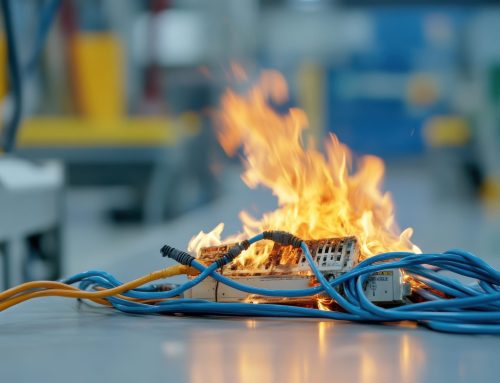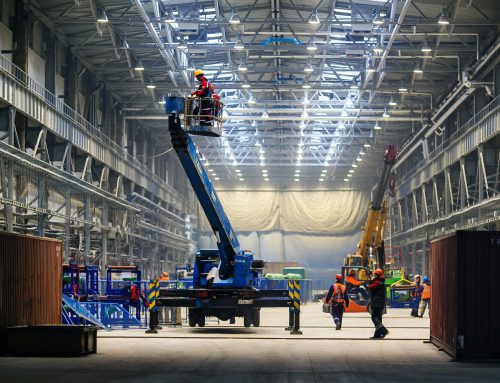Fires have been a significant concern for communities and businesses alike, posing risks to lives, property, and the environment. Among the various types of fires, non-residential fires occurring in commercial, industrial, and institutional properties have garnered attention due to their potential impact on businesses, the economy, and public safety. Statistics provided by the United States Fire Administration (USFA), a division of FEMA, provide some understanding into non-residential fires and their implications.
As an Atlanta staple in fire protection for over 30 years, Fire Systems, Inc. believes sharing these statistics with the community is an important responsibility and one we take seriously. We want to be your source for fire protection when considering the fire dangers and risks associated with non-residential buildings. As you consider our analysis and explanation of these stats provided by USFA, please consider choosing a fire protection company that fits your needs as a business to keep your facility safe and secure from the devastating effects of fire.
Overview of Non-Residential Fires
The USFA’s data on non-residential fires offers a comprehensive overview of incidents, fatalities, injuries, property damage, and causes. According to the latest available statistics, non-residential fires accounted for a substantial portion of all reported fires in the United States.
- Frequency and Incidents– The data reveals that non-residential fires occur frequently, with thousands of incidents reported each year. These incidents include fires in commercial properties, industrial facilities, educational institutions, healthcare facilities, and other non-residential structures.
- Property Damage– Non-residential fires can cause extensive property damage, leading to substantial financial losses for businesses and property owners. The statistics highlight the importance of fire prevention and safety measures within non-residential structures to mitigate the impact of these incidents.
- Fatalities and Injuries– While the loss of life in fires is tragic, non-residential fires have shown a relatively lower fatality rate compared to residential fires. However, they can still result in injuries to occupants, employees, or emergency responders, emphasizing the need for effective fire safety protocols.
Causes of Non-Residential Fires
Understanding the causes of non-residential fires is crucial to develop targeted prevention strategies. The USFA data identifies common causes of these fires:
- Cooking Equipment: Cooking equipment, including commercial kitchens in restaurants and institutional settings, remains a leading cause of non-residential fires. Unattended cooking, equipment malfunctions, and grease buildup are among the primary contributors.
- Electrical Malfunctions: Electrical fires are another prevalent cause of non-residential fires. Overloaded circuits, faulty wiring, and electrical equipment failures can lead to sparks and flames.
- Heating Equipment: Non-residential properties often rely on heating systems, and malfunctions in these systems can lead to fires. Furnaces, boilers, and space heaters demand regular maintenance to prevent accidents.
- Intentional Fires: Arson is a significant concern in non-residential fires, posing a threat to businesses and properties. Vandalism, burglary attempts, or disgruntled employees may be contributing factors.
Preventive Measures and Fire Safety
The statistics demonstrate the importance of implementing robust fire prevention and safety measures in non-residential properties. Business owners, facility managers, and employees can take several proactive steps to minimize the risk of fires.
- Fire Safety Education:
Training employees in fire safety protocols, evacuation procedures, and the proper use of firefighting equipment can significantly reduce the impact of a potential fire incident. Your local fire protection may offer fire extinguisher training courses that can be held on-site. Fire Systems, Inc. offers these training courses to all customers.
- Regular Inspections:
Conducting frequent inspections of electrical systems, heating equipment, and cooking appliances can help identify potential hazards before they escalate into full-blown fires. If you need help maintaining an inspection schedule of your building’s fire protection systems, look for a fire protection company that can track your inspections for you. Fire Systems offers this service to all customers. Our advanced software tracking system ensures you never miss a required inspection.
- Fire Suppression Systems:
Installing and maintaining fire suppression systems, such as sprinklers and fire extinguishers, can swiftly control fires in their early stages, preventing extensive damage.
- Secure Premises:
Implementing security measures to deter arsonists and vandals can reduce the likelihood of intentional fires. Fire Systems offers both fire alarm inspection and installation as well as fire alarm system monitoring.
Fire Systems, Inc.
Non-residential fires remain a serious concern with the potential to cause significant harm to businesses, properties, and lives. By analyzing the statistics provided by the USFA, we gain valuable insights into the frequency, causes, and impact of these fires. Employing proactive fire prevention measures and adhering to strict fire safety protocols is essential for businesses and institutions to protect themselves, their employees, and their assets from the devastating consequences of non-residential fires.
Atlanta-based fire protection company Fire Systems, Inc. can work with you as a business owner to devise a fire protection plan so that your place of business does not become a statistic. We have been in business for over three decades. As an all-services company, we can be your one stop for fire suppression, sprinkler, alarm, and more. Let us show you how we can ensure your building is equipped with the most up-to-date, effective fire protection systems for your particular needs. Call us today at 770-333-7979 or visit our website for additional information and a free estimate. We look forward to speaking with you.






